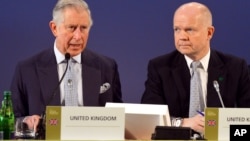China embarked this year on a major campaign to persuade ivory lovers to get out of the habit of buying ivory carvings. That was big news several months ago when television cameras showed bulldozers in Guangzhou crushing tons of elephant tusks confiscated from smugglers.
The campaign in the world’s biggest ivory market continues with the broadcast of public service announcements showing the towering seven-and-a-half foot tall figure of former National Basketball Association player Yao Ming looking down with sadness at a butchered elephant carcass on a Kenya savannah.
Brooke Darby says there should be more campaigns like China’s in many countries. Darby is deputy assistant secretary of state for international narcotics and law enforcement, one of many U.S. agencies that has taken on the poaching issue as part of a global crime wave.
Where did that piece of ivory come from?
“I think we focus a lot on the problem of demand being focused in Asia but, in fact, the United States is a major consumer of wildlife products. We have some work to do as well. We’re right up there.
So when 17 U.S. federal agencies were told to work together on the problem, they learned something about the naivete of American consumers.
“One of the things we’ve learned is that often consumers don’t realize that the animal dies when the tusks or horn are taken,” Darby says. “And, therefore, these trinkets that they have picked up that are made of ivory actually were a function of an animal dying in the field."
That’s important when it is revealed that the United States buys lots of ivory from those dead elephants.
Buying on Broadway and the Internet
John Calvelli of the Wildlife Conservation Society says the United States is one of the largest users of ivory in the world. Probably one of the top five.
“I will tell you, take a walk on the streets of New York and you will find ivory for sale,” says Calvelli. “And you realize that studies have been done that show that probably about one-third of the ivory in the United States comes from illegally killed elephants, so the domestic illegal market is masking the illegal market.”
For many years, it was legal to trade ivory that came from elephants before the United States signed a treaty designed to suppress the trade. That did not make much difference.
John Webb, a former prosecutor of wildlife crimes for the U.S. Justice Department and a member of the President’s Advisory Council on Wildlife Trafficking, confirms the United States is a huge market for ivory sales fueled by Internet sales.
New U.S. ban extends to antiques
For years, U.S. laws prohibited the sale of ivory taken from elephants that were killed after the CITES treaty was signed in 1973. But it was difficult to tell the age of the ivory in a store window. Calvelli says there are efforts to pass a moratorium on all ivory sales in New York State.
But greater impact may come from President Obama’s announcement of a ban on all ivory sales within the United States. The new regulation, which prohibits the trade of any item that contains ivory of any age, is being criticized by antique dealers. If strictly enforced, it could make the sale of certain chess pieces, the handles of revolvers, letter openers, piano keys and the bows of some violins.
Since President Obama issued an executive order creating a 17-agency task force to combat wildlife trafficking, the U.S. Fish and Wildlife Service has prosecuted several cases of black market trade in rhino horns, for example. A Canadian art import and export business doing business in Cameroon and the United States was fined $100,000 for shipping parts of 21 elephants to Ohio.
Building regional enforcement networks
The United States government has become a leader in international efforts to end poaching and international shipment and sales of illegal ivory.
Under a new transnational crime program, the U.S. government offered a $1 million reward for information leading to the arrest of Vixay Keosavang, a Loatian and the kingpin of a major wildlife trafficking network.
The U.S. Agency for International Development has funded regional alliances of conservation and law enforcement agencies such as Asia’s Regional Response to Endangered Species Trafficking (ARREST) in Bangkok, where there have been some successful busts. Webb has watched the growth of these regional networks with great interest.
“Cops don’t trust each other, I mean that’s the bottom line,” says Webb. “So one of the reasons you create these new wildlife enforcement networks is its much easier to work with somebody who you’ve met face to face and know than it is some faceless law enforcement official from a foreign country.”
How long will it take?
More attention is being paid to judicial systems in African countries where wildlife crimes may - or may not - be punished. Webb declares that the government officials and courts of many African countries represent the biggest challenge to the termination of the poaching of wildlife.
Recent thinking now brings together many forces to force a decline in poaching in Africa’s parks: law enforcement, conservation, economic development, government and court reform, and more.
The challenge of saving Africa’s elephants is likely more complex than anyone yet realizes. Varun Vira, an analyst at C4ADS and co-author of Ivory’s Curse: The Militarization and Professionalization of Poaching.
Vira cites the work of the World Bank and others who draw a correlation between poaching and the long-term impacts of the poverty, hunger and infant mortality. These are major issues that haunt vast populations who share Africa with its remaining herds of elephants.
This view supports the notion that the soluton to Africa’s elephant poaching crisis may only be reached by solving many other social, economic and political problems that challenge African mostly rural countries. Some of these observers say that poaching has been going on in Africa for centuries.
The campaign in the world’s biggest ivory market continues with the broadcast of public service announcements showing the towering seven-and-a-half foot tall figure of former National Basketball Association player Yao Ming looking down with sadness at a butchered elephant carcass on a Kenya savannah.
Brooke Darby says there should be more campaigns like China’s in many countries. Darby is deputy assistant secretary of state for international narcotics and law enforcement, one of many U.S. agencies that has taken on the poaching issue as part of a global crime wave.
Where did that piece of ivory come from?
“I think we focus a lot on the problem of demand being focused in Asia but, in fact, the United States is a major consumer of wildlife products. We have some work to do as well. We’re right up there.
So when 17 U.S. federal agencies were told to work together on the problem, they learned something about the naivete of American consumers.
“One of the things we’ve learned is that often consumers don’t realize that the animal dies when the tusks or horn are taken,” Darby says. “And, therefore, these trinkets that they have picked up that are made of ivory actually were a function of an animal dying in the field."
That’s important when it is revealed that the United States buys lots of ivory from those dead elephants.
Buying on Broadway and the Internet
John Calvelli of the Wildlife Conservation Society says the United States is one of the largest users of ivory in the world. Probably one of the top five.
“I will tell you, take a walk on the streets of New York and you will find ivory for sale,” says Calvelli. “And you realize that studies have been done that show that probably about one-third of the ivory in the United States comes from illegally killed elephants, so the domestic illegal market is masking the illegal market.”
For many years, it was legal to trade ivory that came from elephants before the United States signed a treaty designed to suppress the trade. That did not make much difference.
John Webb, a former prosecutor of wildlife crimes for the U.S. Justice Department and a member of the President’s Advisory Council on Wildlife Trafficking, confirms the United States is a huge market for ivory sales fueled by Internet sales.
New U.S. ban extends to antiques
For years, U.S. laws prohibited the sale of ivory taken from elephants that were killed after the CITES treaty was signed in 1973. But it was difficult to tell the age of the ivory in a store window. Calvelli says there are efforts to pass a moratorium on all ivory sales in New York State.
But greater impact may come from President Obama’s announcement of a ban on all ivory sales within the United States. The new regulation, which prohibits the trade of any item that contains ivory of any age, is being criticized by antique dealers. If strictly enforced, it could make the sale of certain chess pieces, the handles of revolvers, letter openers, piano keys and the bows of some violins.
Since President Obama issued an executive order creating a 17-agency task force to combat wildlife trafficking, the U.S. Fish and Wildlife Service has prosecuted several cases of black market trade in rhino horns, for example. A Canadian art import and export business doing business in Cameroon and the United States was fined $100,000 for shipping parts of 21 elephants to Ohio.
Building regional enforcement networks
The United States government has become a leader in international efforts to end poaching and international shipment and sales of illegal ivory.
Under a new transnational crime program, the U.S. government offered a $1 million reward for information leading to the arrest of Vixay Keosavang, a Loatian and the kingpin of a major wildlife trafficking network.
The U.S. Agency for International Development has funded regional alliances of conservation and law enforcement agencies such as Asia’s Regional Response to Endangered Species Trafficking (ARREST) in Bangkok, where there have been some successful busts. Webb has watched the growth of these regional networks with great interest.
“Cops don’t trust each other, I mean that’s the bottom line,” says Webb. “So one of the reasons you create these new wildlife enforcement networks is its much easier to work with somebody who you’ve met face to face and know than it is some faceless law enforcement official from a foreign country.”
How long will it take?
More attention is being paid to judicial systems in African countries where wildlife crimes may - or may not - be punished. Webb declares that the government officials and courts of many African countries represent the biggest challenge to the termination of the poaching of wildlife.
Recent thinking now brings together many forces to force a decline in poaching in Africa’s parks: law enforcement, conservation, economic development, government and court reform, and more.
The challenge of saving Africa’s elephants is likely more complex than anyone yet realizes. Varun Vira, an analyst at C4ADS and co-author of Ivory’s Curse: The Militarization and Professionalization of Poaching.
Vira cites the work of the World Bank and others who draw a correlation between poaching and the long-term impacts of the poverty, hunger and infant mortality. These are major issues that haunt vast populations who share Africa with its remaining herds of elephants.
This view supports the notion that the soluton to Africa’s elephant poaching crisis may only be reached by solving many other social, economic and political problems that challenge African mostly rural countries. Some of these observers say that poaching has been going on in Africa for centuries.






